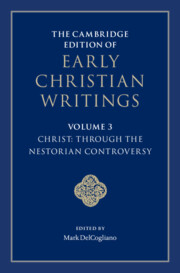Book contents
- The Cambridge Edition of Early Christian Writings
- The Cambridge Edition of Early Christian Writings
- The Cambridge Edition of Early Christian Writings
- Copyright page
- Contents
- Notes on Contributors
- Acknowledgments
- Note on the Texts and Translations
- Abbreviations
- Series Introduction
- Introduction
- Part I The Beginnings of Christology
- Part II Developing Christological Traditions
- Part III Traditions of Pro-Nicene Christology
- 21 Tome to the Antiochenes 7
- 22 Athanasius of Alexandria, Christological Letters to Epictetus, Adelphius, and Maximus
- 23 Apollinarius of Laodicea, Recapitulation
- 24 Apollinarius of Laodicea, Selected Letters
- 25 Apollinarius of Laodicea, On the Faith and the Incarnation
- 26 Apollinarius of Laodicea, On the Body’s Union with the Divinity in Christ
- 27 Apollinarius of Laodicea, Fragments of Other Writings
- 28 Apollinarius of Laodicea, Fragmentary Writings against Diodore and Flavian
- 29 Basil of Caesarea, Letters 261 and 262
- 30 Basil of Caesarea, Homily on the Holy Birth of Christ
- 31 Diodore of Tarsus, Selected Fragments
- 32 Gregory of Nazianzus, Letter 101 to Cledonius
- 33 Gregory of Nazianzus, Poems 1.1.10–11
- 34 Gregory of Nyssa, Oration on the Savior’s Nativity
- 35 Theodore of Mopsuestia, On the Incarnation of the Lord against the Apollinarians and Eunomians (Fragments)
- 36 Augustine of Hippo, On Eighty-Three Different Questions. Number 80: Against the Apollinarians
- 37 Augustine of Hippo, Letter 137
- 38 The Leporius Dossier
- 39 Theodoret of Cyrrhus, Exposition of the Orthodox Faith
- Part IV Controversy over Nestorius
- Suggestions for Further Reading
- Scriptural Index
37 - Augustine of Hippo, Letter 137
from Part III - Traditions of Pro-Nicene Christology
Published online by Cambridge University Press: 05 February 2022
- The Cambridge Edition of Early Christian Writings
- The Cambridge Edition of Early Christian Writings
- The Cambridge Edition of Early Christian Writings
- Copyright page
- Contents
- Notes on Contributors
- Acknowledgments
- Note on the Texts and Translations
- Abbreviations
- Series Introduction
- Introduction
- Part I The Beginnings of Christology
- Part II Developing Christological Traditions
- Part III Traditions of Pro-Nicene Christology
- 21 Tome to the Antiochenes 7
- 22 Athanasius of Alexandria, Christological Letters to Epictetus, Adelphius, and Maximus
- 23 Apollinarius of Laodicea, Recapitulation
- 24 Apollinarius of Laodicea, Selected Letters
- 25 Apollinarius of Laodicea, On the Faith and the Incarnation
- 26 Apollinarius of Laodicea, On the Body’s Union with the Divinity in Christ
- 27 Apollinarius of Laodicea, Fragments of Other Writings
- 28 Apollinarius of Laodicea, Fragmentary Writings against Diodore and Flavian
- 29 Basil of Caesarea, Letters 261 and 262
- 30 Basil of Caesarea, Homily on the Holy Birth of Christ
- 31 Diodore of Tarsus, Selected Fragments
- 32 Gregory of Nazianzus, Letter 101 to Cledonius
- 33 Gregory of Nazianzus, Poems 1.1.10–11
- 34 Gregory of Nyssa, Oration on the Savior’s Nativity
- 35 Theodore of Mopsuestia, On the Incarnation of the Lord against the Apollinarians and Eunomians (Fragments)
- 36 Augustine of Hippo, On Eighty-Three Different Questions. Number 80: Against the Apollinarians
- 37 Augustine of Hippo, Letter 137
- 38 The Leporius Dossier
- 39 Theodoret of Cyrrhus, Exposition of the Orthodox Faith
- Part IV Controversy over Nestorius
- Suggestions for Further Reading
- Scriptural Index
Summary
The surviving body of writings from Augustine includes a large corpus of letters, most from his time as bishop of Hippo in his native North Africa. The letters, which include briefs to as well as from Augustine, cover a remarkable range of topics. Letter 137 is part of a fascinating dossier of letters from around 412 between Augustine and the talented young aristocrat Rufus Antonius Agrypnius Volusianus. Volusian, as we will call him, was the son of the famous Christian patroness Melania the Elder, but not himself a Christian. He did not hesitate to share his doubts about Christian teaching with Augustine, who must have been his senior by at least thirty years. At one particular meeting of young aristocrats, which Augustine mentions in Letter 137, Volusian encountered objections to the Christian doctrine of the incarnation, which he vowed to forward to Augustine for a reply.1 The main issue Volusian notes is the seeming incongruity in the doctrine, which posits that the ruler of heaven was confined in the tiny body of an infant and underwent the ordinary experiences of a human being.
- Type
- Chapter
- Information
- The Cambridge Edition of Early Christian Writings , pp. 494 - 509Publisher: Cambridge University PressPrint publication year: 2022

